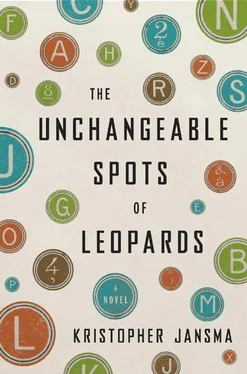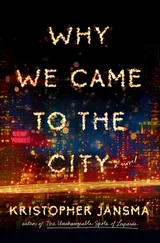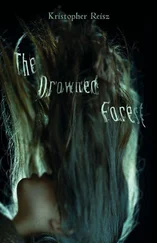Einar shrugs. “Most Icelanders don’t believe, really. We just don’t not believe. Some of us think of them as a mischievous force, not little things with pointy ears.”
I scoff and mutter, “Say what you want about reality TV, but at least in America we don’t believe in elves.”
“Oh,” Einar says wryly. “Well. You win.”
Figuring I may as well take my chance, I lean in closely and ask Einar if he knows another American, my age, staying at the colony, named Jeffrey Oakes.
He arches his pieced eyebrows and leans in. “Jeffrey Oakes?” He whispers even though there is no one else in the room — except perhaps the elves. “He’s here ?”
I nod. “At least he was here. I’m sort of looking for him.”
Einar shakes his head. “I haven’t seen him. But the caretaker’s office is over at the carriage house. Zaff’ll tell you what room to find your friend in.”
I wince, looking out the window. The dark carriage house appears to be a half mile away, up a snowy hill that I’m not sure I can climb, given my leg.
Einar invites me to stop by his room later to try a little Brennivín. The lining of my throat prickles at the thought of some new, strange nectar of the writing gods. But even as I promise to join him, the smell of Molly’s caraway-tainted puke rises in my nostrils again, and I have second thoughts. Einar goes back to round his word count up to an even twenty for the day, and I return to my own room. There are six more books on my nightstand and my sheets have been changed. My typewriter has been reloaded with paper and my morning’s stalled draft has been placed on a pile with the dozens of similar drafts from previous mornings. I begin to put on every warm item of clothing I own. I decide I am going to make it out to the carriage house and find the man in charge of this exceedingly strange colony — and perhaps, even, Jeffrey. If I die in the attempt at least I won’t have to finish my novel.
Reaching the carriage house seems even more impossible as soon as I am outside in the brutal elements. Even bundled in two coats, I feel the glacial cold freezing the marrow inside my bones. It is still dark out and the air carries the faint smell of a distant icy sea. My injury forces my steps to be deliberate as I traverse the waist-high snowbanks that cover the path. As I tunnel up the hill, I wonder how Franklin W. Zaff could possibly be doing any caretaking without maintaining a better path through these mounds of ice. The edges are so high that I can’t see the cabin after a while. But I keep a bearing on that strange light in the sky, as it reflects off snow that is falling steadily, many miles away.
My leg is throbbing and I think I am barely halfway there. I turn around and see that the walls of my path have collapsed in places, and it will be hardly easier to get back down again. There is a new, duller pain in my fingertips and toes that I suspect vaguely as probably frostbite. I wonder what would happen if I lost my fingers. Screw the toes. I could live without toes. But without fingers I couldn’t hit the keys on the typewriter or grip a pen. At first I think this may be some sort of sweet relief — a reprieve from writing the same scene over and over. But the writing over and over isn’t really a sign of madness. It’s the only thing letting the madness out. With grim certainty I decide that if I feel a finger snapping off I’ll do the only sensible thing and lie down and die. I wonder if they’d find me — in six months or so — after the thaw. I wonder if they’d understand why I’d given up.
After a few minutes I carve my way into a small rocky outcropping. Just as I’m about to go around it, I see that I can get on top of it. And this gets my head above the drifts. Then I can see it — off to what I think is the southeast — a pillar of white light rising out of the choppy sea, just past the horizon. I forget my pain in moments. There is something absolutely insane yet incredible about it — a memorial built in the middle of nowhere at all, crying “Imagine Peace” to the descendants of last millennium’s Vikings. It is the sort of singular, absurd devotional that only great love can inspire. This is what I am trying to build each morning with my steam train of words. Something everlasting for a love that didn’t last. When I have my breath back, I press on, carving my way steadily to the door of the old carriage house.
I let myself in and find, to my extreme disappointment, that the lights are out and no one is there. As I enter I stumble roughly over a wooden mailing crate that has been set just beside the door, and nearly fly headlong toward a sleekly modern desk. I catch myself on its edge, and though my leg flares angrily in pain and I knock over quite a few papers, I manage to avoid smashing my head. The room is lit only by the faint glow of Yoko’s distant light.
“Is anyone here?” I shout, but there is no answer. “Anyone at all?”
Looking for something — a guest book, maybe, or even a sign-in sheet — I carefully stack up the papers I have knocked over. All of them are written in indecipherable Icelandic, except for the return addresses on two unopened letters, which lie in a pile of unopened mail by the door — all several weeks old from the postmarks. One of them is a crisp, clean envelope from the offices of Emmetz, Moscowitz, and Bing. With only slight trepidation, I open it and find inside a strongly worded threat of pending legal action, on the behalf of one Mrs. Pauline Oakes, that her son be produced immediately. Slowly I begin to suspect that no one has been in this office for some time.
The second letter confirms these fears. Franklin W. Zaff, of 28 Bistlethwaite Court, Herefordshire, UK, writes the following:
To Whom It May Concern at the Laxness-Hallgrímsson Writers’ Colony:
Unfortunately I will be unable to take over the position of winter curator, due to the unexpected moving-up of the publication date of my new novel, THE FINDER’S KEEPER, which as you know was not due out until the coming summer. My editor at Haslett & Grouse requires me suddenly for book signings, readings, guest lectures, etc., and I feel it would be in my best interests, professionally, to make myself available. I do realize, naturally, that this is on somewhat short notice, and I hope that a suitable replacement can be found before the current curator departs.
With heavy heart,
Franklin W. Zaff
Crumpling the letter and tossing it aside, I wonder if I might be able somehow to gather every existing copy of The Finder’s Keeper and burn Franklin W. Zaff on a pyre built out of them. If the postmarks are to be believed, there has been no one in these offices for three weeks at least. The bulk of the writers remaining have been either too self-absorbed to notice that they’ve been utterly abandoned or too terrified to face this possibility.
Not sure how to proceed, I sit there for a few more minutes, and soon my eye wanders to the packing slip on the large wooden crate that I nearly somersaulted over upon my entry. In the dim light I can just make out the familiar logo of Oakes International. I turn the box and see, to my delight, that the shipment is for “Mr. Anton Prishibeyev. The Suite at the Top of the Bell Tower. Laxness-Hallgrímsson Writers’ Colony, Akranes, Iceland.”
I stare down at the name for a moment even before I recognize the alias I gave to Jeffrey once, in a piece of fiction written a lifetime ago, but once I do, it brings a very warming smile.
The problem now, however, is that the Bell Tower is all the way back down the hill. And my leg already feels like someone has been sawing it against a pine tree for an hour. My eyes fall onto the thin, wooden desk and suddenly I have an idea. Clearing it off with wild swipes of my arms, I invert the desk and lay it on the snow outside the door. It sinks into the snow only a little; it is of such light, modern construction. Unfortunately, when I throw my emaciated weight onto my makeshift sled, it is not enough to propel us down the path. For a moment I lie there, feeling the falling snow covering me, and I ponder the end. If this is it, I think, then I’m at least breaking into Jeffrey’s wine. I reach down to pry off the lid, and then — inspiration.
Читать дальше











